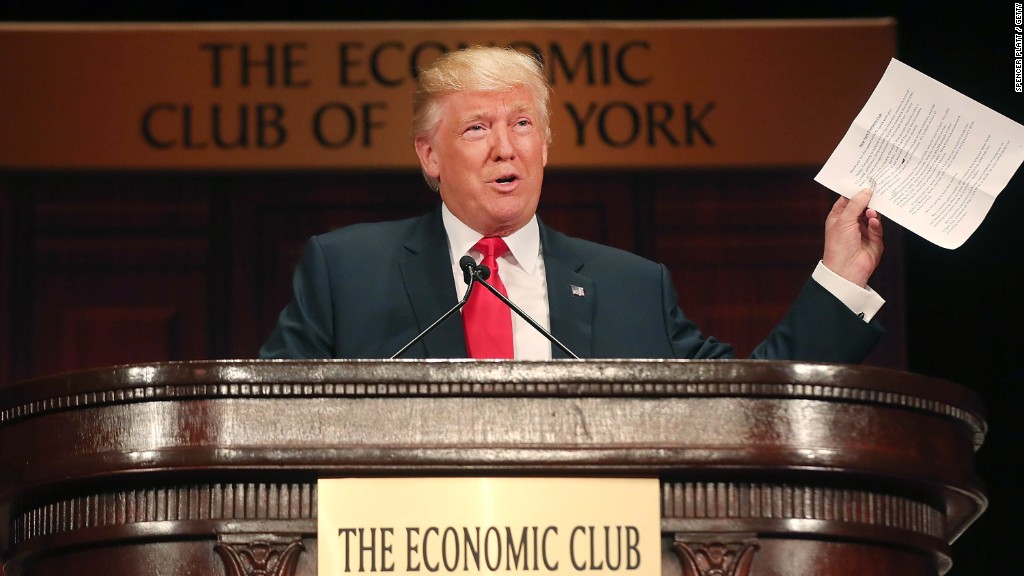
The matchup between Hillary Clinton and Donald Trump is the wackiest U.S. election of our lifetimes. It isn't helping the economy
Growth was already off to a lousy start in 2016. Experts predicted a summer rebound, but so far, election concerns are growing and the economic gauges are lagging.
"Ultimately, what will determine whether we have a recession next year is the comfort level Americans have with who occupies the White House in 2017," says Bernard Baumohl, chief global economist at The Economic Outlook Group.
Right now, that comfort level is low. Most voters don't like Clinton or Trump, according to "unfavorability ratings" in the polls. In corporate America, there's alarm at how tight the race is now. Many believe Clinton would be better for the economy than Trump, but even with Clinton, CEOs have concerns about how friendly she will be toward businesses.
Just take a look at what CEOs of America's top companies are saying lately.
Related: Trump supporters want him to release his tax returns
U.S. businesses are concerned
Nearly 20% of the S&P 500 companies mentioned the presidential election in their latest quarterly earnings call as a red flag.
"It seems as though every time things begin to settle, something else happens, like Brexit or the dynamics of the upcoming U.S. election, to underscore that there's nothing normal about the new normal," said Campbell Soup (CPB) CEO Denise Morrison on July 20.
"There's a presidential election ... I think has some very unique characteristics that could be affecting the mindset of middle America consumers," said Signet Jewelers (SIG) CEO Mark Light on August 25.
"I think the election here in the United States is a level of uncertainty that's probably unsettling consumers right now," said Arthur Peck, CEO of Gap (GPS) on September 7.
Related: Trump vs. Clinton: Recession vs. new jobs
The Trump wild card
A simple recipe powers the U.S. economy: People and businesses have to go buy stuff. When they do, America prospers. When they don't, America suffers.
The great fear is that the chaos of the election will cause Americans to keep their wallets shut. It's already happening among CEOs. Yes, businesses are still hiring workers (U.S. job openings are at a record high), but companies aren't spending much on new equipment and research.
This isn't a totally new phenomenon. Research shows a slowdown in so-called "capital expenditures" is common in election years. But Trump is a wild card that's arguably making businesses even more cautious.
"A candidate like Donald Trump is the mother of all uncertainties," says Baumohl. Businesses don't like to make huge investments in uncertain times.
Growth was already slow in 2016
America's economy only grew 1% in the first half of the year, well below the historic average of over 3% (and even below the not so great 2.4% rate of the past two years). A lot of that sluggish growth is blamed on companies holding back on big purchases because of the energy sector slump and Brexit. Now the U.S. election is on everyone's minds.
"The election -- or the circus -- that is being played out is certainly not helping the economy," says economist Ed Yardeni, president of Yardeni Research.
In August, Clinton held a sizable lead. But Trump is the ultimate wild card. The usual models don't seem to fully capture the Trump effect. The race is now again neck-and-neck in key swing states.
"One would have to be foolish NOT to be uncertain," says economist Diane Swonk of DS Economics.
Related: Hiring slows: America gains 151,000 jobs in August
Will Americans keep spending?
The question is whether the American shoppers are also getting spooked. Business spending is important, but individual spending makes up the bulk -- nearly 70% -- of the U.S. economy.
So far this year, consumers have been the bright spot. Americans aren't spending quite as much as the lush pre-recession days, but they still shopping online and in (some) stores. Consumer confidence has rebounded to the highest levels since the crisis.
But in August, retail sales came in far lower than expected. It could just be a blip -- or the beginning of deeper concern moving from businesses to Main Street.
"Between now and [the election,] CEOs and consumers will scale back spending, especially if polls show the race is a tight one," predicts Baumohl of The Economic Outlook Group.
The bottom line is the U.S. -- and global -- economies were already in a mediocre state. The Trump v. Clinton election is only adding to the list of concerns. The Federal Reserve is expected to hold off on raising interest rates today because of the unease (although the Fed doesn't like to admit it takes U.S. politics into account).
"It's only one more ingredient, but, unfortunately, it's an ingredient in a very poor stew," says Swonk of DS Economics.


